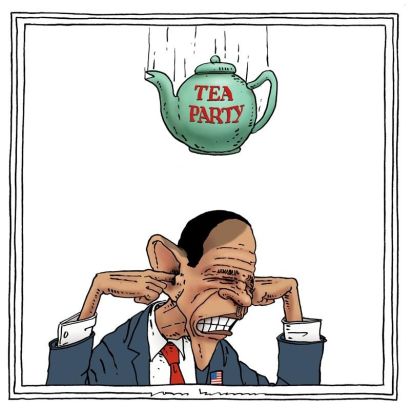
[Het
Parool, The Netherlands]
Wen Wei Po, Hong
Kong
Blaming China Led Obama to Midterm Election Defeat
"Since
taking office, Obama has blamed U.S. trade and unemployment problems on how the
yuan is pegged to the dollar. This is an attempt to divert public attention and
shift the blame for a sluggish economy to China. But to accelerate U.S.
economic growth and create employment opportunities, the key is to change its
protectionist trade policies and enhance the competitiveness of U.S.
companies."
EDITORIAL
Translated By Sarah
Chan
November 11,
2010
Hong Kong - Wen Wei Po - Original Article
(Chinese)
As the dust settles after the
U.S. midterm elections, Obama's Democratic majority lost the House of
Representatives, and maintains only a slight advantage in the Senate. The
election results reflect voter disappointment with Obama's failure to revive
the economy and were an expression of strong dissatisfaction with the
effectiveness of his policies.
But solving the economic
crisis triggered by the financial tsunami is by no means easy. These are persistent
and deeply-rooted problems in the U.S. economy and society and are not easy to
resolve, regardless of which party holds power. If the United States doesn't
find solutions to its domestic problems and instead shifts blame to the yuan exchange
rate or trade protectionism, it will certainly be like climbing a tree to catch
fish - an utterly wasted effort.
Obama's election was based on
wave of popularity for him as the first Black U.S. president. American voters
had high expectations, hoping that Obama would accomplish a lot and lead the
U.S. out of the economic downturn with a rapid cleansing of the mess left by
President Bush and the Republicans. But two years later, the U.S. economy remains
stagnant, with unemployment hovering around a high of ten percent, and the
American public has lost its patience. This election was even considered
to be a "referendum" on the policies of Obama and the Democratic
Party, as voters use ballots to express dissatisfaction with his achievements.
In fact, the instigator of
the current U.S. economic downturn was the Bush Administration's lax regulation
of financial institutions, which allowed Wall Street elites to cause wild
shifts in financial markets. To bring recovery to a weak economy, Obama changed
the fiscal policy of "limited-government liberalism" that the U.S.
had been pursuing to allow the state to take control of the financial system,
increase spending and implemented quantitative easing to stimulate the economy
and improve employment.
But there has been no
improvement in the economy and market sentiment remains pessimistic. This shows
that America's sluggish economy is not only because of problems in the
financial sector, but long-term over-consumption, excessive borrowing and the
pursuit of high fiscal deficits that increase the level and complexity of social conflict within American society. This has
caused the U.S. banking system, businesses and the public to lose confidence in
the economic outlook. In times of economic crisis, only a strong government can
get the economy back on track. But the results of this midterm election reveal a
weak government that could lead to stalemate.
Posted
by WORLDMEETS.US
SEE ALSO ON THIS:
Le Temps, Switzerland:
Obama Pays Big for Anemic Growth
Le Figaro, France:
Tea Party: An 'American
Fever' that Will Quicky Pass
News, Switzerland:
Obama: Don't Bargain with Your 'Political Assassins'
La Jornada, Mexico:
Obama 'Bit Off More than He Could Chew'
Le Temps, Switzerland:
Cheap Advice for President Obama
Tageblatt, Luxembourg:
Prepare for 'Tea Time' in America
El Pais, Spain:
As U.S. Exposes its Divisions, China Powers Ahead
Global Times, China:
The West is Forming an 'Axis of Evil Ideology'
Hispanidad, Spain:
How Spain Can Build its Own Tea Party: Copy Palin
El Universal, Mexico:
Immigration Reform: Obama's Ace in the Hole
Le Temps, Switzerland:
America's 'Cry of Agony' Through the Tea Party
Izvestia, Russia:
Evil Obama and China's Yuan: It's About the Midterms
Liberation, France:
Christine O’Donnell at the 'Oral Stage'
Financial Times Deutschland, Germany:
West Must Halt Slide Since 9-11
El Mercurio, Spain:
The 'Neo-Nazi' Campaign Against President Obama
El Mundo, Spain:
Beck and Palin Search for Mythical 'Paradise Lost'
Der Standard, Austria:
In Despair Over Democracy - Both America's and Ours
National Post, Canada:
U.S. Democracy Suffers 'Death By Talk-Show Host'
La Jornada, Mexico:
Beck and the New U.S.-Right: 'Like a Horror Movie'
Iraq News Agency, Iraq:
Sarah Palin: The 'Seductress' of the American Election
In China, it's a sensitive issue
whenever the U.S. holds an election. Since taking office, Obama has blamed U.S.
trade and unemployment problems on how the yuan is pegged to the dollar. This
is an attempt to divert public attention and shift the blame for a sluggish
economy to China. But to accelerate U.S. economic growth and create employment
opportunities, the key is to change its protectionist trade policies and enhance
the competitiveness of U.S. companies.
Instead of starting to
improve the economy at home, Obama sought to benefit by suppressing China, and
of course the results have been just the opposite. After the midterm elections,
Democrats and Republicans should recognize the importance of Sino-U.S.
relations, not only in economics and trade, but in diplomacy as well. It is important
to maintain stable, rational and pragmatic development of Sino-U.S. relations.
CLICK HERE FOR CHINESE VERSION
[Posted
by WORLDMEETS.US November 4, 1:40pm]

